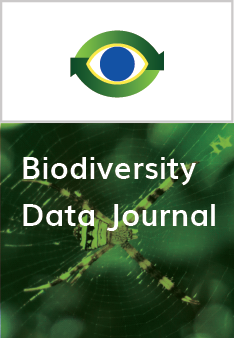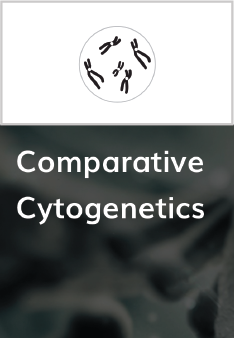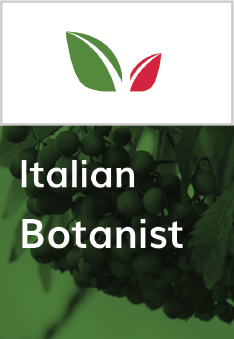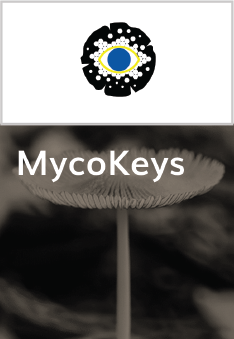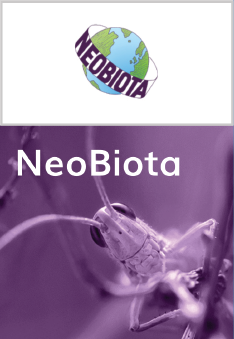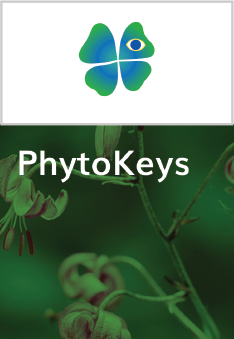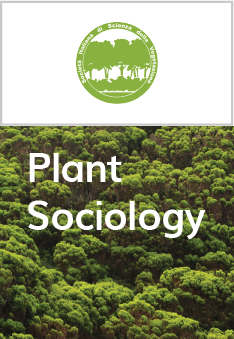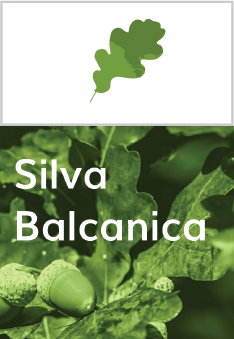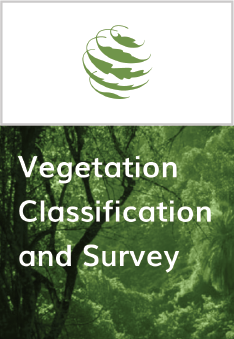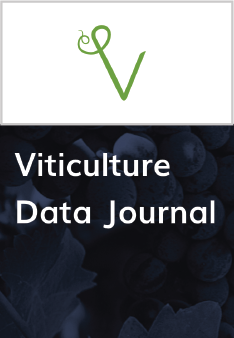Browse Journals
JOURNALS
Designed to accelerate publishing, dissemination and sharing of biodiversity data, this journal is the first to offer integrated publication of narrative and data within the article content.
Biodiversity Data Journal (BDJ) is a community peer-reviewed, open access journal, designed to accelerate publishing, dissemination and sharing of biodiversity-related data of any kind. All structural elements of the articles – text, morphological descriptions, occurrences, data tables, etc. – are treated and stored as data.
The journal publishes papers in biodiversity science containing taxonomic, floristic/faunistic, morphological, genomic, phylogenetic, ecological or environmental data on any taxon of any geological age from any part of the world. BDJ aims at integrating data and narrative in the article content to the maximum extent possible. Supplementary data files that underpin graphs, hypotheses and results should also be published with the article or deposited in trusted open access data repositories. The journal provides rich biodiversity data import and export facilities through the ARPHA Writing Tool and Darwin Core Archives.
Q3: Ecology, Evolution, Behavior and Systematics
Q2: Agricultural and Biological Sciences
Q2: Animal Science and Zoology
Q3: Insect Science
Q2: Plant Science
 , AGORA, AGRICOLA, AGRIS, Altmetric, ASCI, ASOS Indeks, Baidu Scholar, BASE, British Library, Cabell's Directory, CABI, ChronosHub, CNKI, CrossRef, Dimensions, EBSCO Essentials, EBSCOhost, eLibrary, EZB, FreeFullPDF, GALE Academic OneFile, Genamics JournalSeek, GoOA, Google Scholar, iDiscover (University of Cambridge), Index Copernicus, IPNI, J-Gate, Journals for Free (J4F), JournalTOCs, JURN, Keepers, Lens, LetPub, Library of Congress, LIVIVO, Mendeley, MIAR, Microsoft Academic, Mir@bel, MyScienceWork, NAVER, NAVIGA, Norwegian Register, OpenAIRE, OpenAlex, OpenBiodiv, OpenBioDiv, OpenCitations, Ou-Publier?, Paperity, POL-Index, ProQuest, ProQuest Central, ProQuest Central Essentials, ProQuest Central Student, ProQuest (Natural Science Collection), ProQuest One Academic, PubAg, PubMed/MEDLINE, QOAM, ReadCube, Research4Life, ResearchBib, Research Gate, ROAD, Scibey, Science Data Bank, ScienceOpen, Scilit, Scite, SciTech Premium Collection, Semantic Scholar, Sherpa/Romeo, SIBiLS, SJR Scimago, SOLO (Search Oxford Libraries Online), Swisscovery, Transpose, Ulrichsweb™, Unpaywall, Vifabio, WanFang Data, Web of Science Researcher Profile (ex-Publons), WorldCat, X-MOL, ZDB
, AGORA, AGRICOLA, AGRIS, Altmetric, ASCI, ASOS Indeks, Baidu Scholar, BASE, British Library, Cabell's Directory, CABI, ChronosHub, CNKI, CrossRef, Dimensions, EBSCO Essentials, EBSCOhost, eLibrary, EZB, FreeFullPDF, GALE Academic OneFile, Genamics JournalSeek, GoOA, Google Scholar, iDiscover (University of Cambridge), Index Copernicus, IPNI, J-Gate, Journals for Free (J4F), JournalTOCs, JURN, Keepers, Lens, LetPub, Library of Congress, LIVIVO, Mendeley, MIAR, Microsoft Academic, Mir@bel, MyScienceWork, NAVER, NAVIGA, Norwegian Register, OpenAIRE, OpenAlex, OpenBiodiv, OpenBioDiv, OpenCitations, Ou-Publier?, Paperity, POL-Index, ProQuest, ProQuest Central, ProQuest Central Essentials, ProQuest Central Student, ProQuest (Natural Science Collection), ProQuest One Academic, PubAg, PubMed/MEDLINE, QOAM, ReadCube, Research4Life, ResearchBib, Research Gate, ROAD, Scibey, Science Data Bank, ScienceOpen, Scilit, Scite, SciTech Premium Collection, Semantic Scholar, Sherpa/Romeo, SIBiLS, SJR Scimago, SOLO (Search Oxford Libraries Online), Swisscovery, Transpose, Ulrichsweb™, Unpaywall, Vifabio, WanFang Data, Web of Science Researcher Profile (ex-Publons), WorldCat, X-MOL, ZDBEstablished to cater to the needs of biodiversity conservation, the journal publishes papers on the geographic distribution of species and higher taxonomic groups.
Check List is a peer-reviewed, open access, on-line journal devoted to publishing Annotated List of Species, Notes on Geographic Distribution of one or a few species, and Distribution Summary of a taxonomic group. These data are essential for studies on biogeography and provide a baseline for the conservation of biodiversity as a whole. The first step to undertaking effective conservation action is to understand species’ geographic distribution. Check List was established to cater to this need by publishing papers on the geographic distribution of species and higher taxonomic groups.
Q4: Zoology
Q3: Ecology, Evolution, Behavior and Systematics
Q3: Animal Science and Zoology
Q3: Insect Science
Q3: Plant Science
 , AGORA, AGRICOLA, AGRIS, Altmetric, ASCI, ASOS Indeks, Baidu Scholar, BASE, British Library, Cabell's Directory, CABI, ChronosHub, CNKI, CrossRef, Dimensions, EBSCO Essentials, EBSCOhost, eLibrary, ERIH PLUS, EZB, FreeFullPDF, GALE Academic OneFile, GoOA, Google Scholar, iDiscover (University of Cambridge), Index Copernicus, J-Gate, JournalGuide, Journals for Free (J4F), JournalTOCs, JURN, Keepers, LatIndex, Lens, LetPub, Library of Congress, LIVIVO, Mendeley, MIAR, Microsoft Academic, Mir@bel, NAVER, NAVIGA, Norwegian Register, OpenAIRE, OpenAlex, Paperity, POL-Index, ProQuest, ProQuest Central, ProQuest Central Essentials, ProQuest Central Student, ProQuest (Natural Science Collection), ProQuest One Academic, PubAg, QOAM, ReadCube, Research4Life, ResearchBib, Research Gate, ROAD, Scibey, Science Data Bank, ScienceOpen, Scilit, Scite, SciTech Premium Collection, Semantic Scholar, Sherpa/Romeo, SJR Scimago, SOLO (Search Oxford Libraries Online), Swisscovery, Transpose, Ulrichsweb™, Unpaywall, Vifabio, WanFang Data, Web of Science Researcher Profile (ex-Publons), WorldCat, X-MOL, ZDB
, AGORA, AGRICOLA, AGRIS, Altmetric, ASCI, ASOS Indeks, Baidu Scholar, BASE, British Library, Cabell's Directory, CABI, ChronosHub, CNKI, CrossRef, Dimensions, EBSCO Essentials, EBSCOhost, eLibrary, ERIH PLUS, EZB, FreeFullPDF, GALE Academic OneFile, GoOA, Google Scholar, iDiscover (University of Cambridge), Index Copernicus, J-Gate, JournalGuide, Journals for Free (J4F), JournalTOCs, JURN, Keepers, LatIndex, Lens, LetPub, Library of Congress, LIVIVO, Mendeley, MIAR, Microsoft Academic, Mir@bel, NAVER, NAVIGA, Norwegian Register, OpenAIRE, OpenAlex, Paperity, POL-Index, ProQuest, ProQuest Central, ProQuest Central Essentials, ProQuest Central Student, ProQuest (Natural Science Collection), ProQuest One Academic, PubAg, QOAM, ReadCube, Research4Life, ResearchBib, Research Gate, ROAD, Scibey, Science Data Bank, ScienceOpen, Scilit, Scite, SciTech Premium Collection, Semantic Scholar, Sherpa/Romeo, SJR Scimago, SOLO (Search Oxford Libraries Online), Swisscovery, Transpose, Ulrichsweb™, Unpaywall, Vifabio, WanFang Data, Web of Science Researcher Profile (ex-Publons), WorldCat, X-MOL, ZDBThis journal publishes original research on all aspects of plant, fungal and animal cytogenetics, karyosystematics, molecular systematics and genomics.
Comparative Cytogenetics is a peer-reviewed, open access, online journal, launched to accelerate research on all aspects of plant, fungal and animal cytogenetics, and genomics. It publishes articles of high scientific quality reporting comprehensive research on descriptions and photos of karyotypes, characteristics of mitosis and meiosis, mechanisms of sex determination, reproductive biology, gametogenesis, molecular systematics, comparative genomics, and taxonomic conclusions.
Q3: Plant Sciences
Q3: Zoology
Q3: Biotechnology
Q4: Genetics
Q3: Plant Science
Q3: Insect Science
Research Papers, Review Papers, Forum Papers, Data Papers, Software Descriptions, Editorials, Correspondences, Corrigenda, Monographs
 , AGORA, AGRICOLA, AGRIS, Altmetric, ASCI, ASOS Indeks, Baidu Scholar, BASE, BHL Citebank, British Library, Cabell's Directory, ChronosHub, CNKI, CNPIEC, CrossRef, Dimensions, EBSCO Essentials, EBSCOhost, eLibrary, EZB, FreeFullPDF, GALE Academic OneFile, Genamics JournalSeek, GoOA, Google Scholar, iDiscover (University of Cambridge), Index Copernicus, J-Gate, JournalGuide, Journals for Free (J4F), JournalTOCs, JURN, Keepers, Lens, LetPub, Library of Congress, LIVIVO, Mendeley, MIAR, Microsoft Academic, Mir@bel, NAVER, NAVIGA, OpenAIRE, OpenAlex, OpenBiodiv, OpenBioDiv, OpenCitations, Paperity, POL-Index, ProQuest, ProQuest Central, ProQuest (Natural Science Collection), PubAg, PubMed/MEDLINE, QOAM, ReadCube, Research4Life, ResearchBib, Research Gate, ROAD, Scibey, Science Data Bank, ScienceOpen, Scilit, Scite, Semantic Scholar, Sherpa/Romeo, SIBiLS, SJR Scimago, SOLO (Search Oxford Libraries Online), Swisscovery, Transpose, Ulrichsweb™, Unpaywall, Vifabio, WanFang Data, Web of Science Researcher Profile (ex-Publons), WorldCat, X-MOL, ZDB, Zetoc, РИНЦ
, AGORA, AGRICOLA, AGRIS, Altmetric, ASCI, ASOS Indeks, Baidu Scholar, BASE, BHL Citebank, British Library, Cabell's Directory, ChronosHub, CNKI, CNPIEC, CrossRef, Dimensions, EBSCO Essentials, EBSCOhost, eLibrary, EZB, FreeFullPDF, GALE Academic OneFile, Genamics JournalSeek, GoOA, Google Scholar, iDiscover (University of Cambridge), Index Copernicus, J-Gate, JournalGuide, Journals for Free (J4F), JournalTOCs, JURN, Keepers, Lens, LetPub, Library of Congress, LIVIVO, Mendeley, MIAR, Microsoft Academic, Mir@bel, NAVER, NAVIGA, OpenAIRE, OpenAlex, OpenBiodiv, OpenBioDiv, OpenCitations, Paperity, POL-Index, ProQuest, ProQuest Central, ProQuest (Natural Science Collection), PubAg, PubMed/MEDLINE, QOAM, ReadCube, Research4Life, ResearchBib, Research Gate, ROAD, Scibey, Science Data Bank, ScienceOpen, Scilit, Scite, Semantic Scholar, Sherpa/Romeo, SIBiLS, SJR Scimago, SOLO (Search Oxford Libraries Online), Swisscovery, Transpose, Ulrichsweb™, Unpaywall, Vifabio, WanFang Data, Web of Science Researcher Profile (ex-Publons), WorldCat, X-MOL, ZDB, Zetoc, РИНЦBack issues of volume 1 to 3 (2007-2009) are available here
Covering all fields of botany in its wider sense, including mycology, this journal of the Italian Botanical Society welcomes research ranging from molecular to ecosystem studies.
Italian Botanist is an open access, peer-reviewed journal of the Italian Botanical Society (www.societabotanicaitaliana.it). It was founded in 1969 as Informatore Botanico Italiano to mainly publish proceedings of the Society, alongside book reviews. As submissions and publication types increased throughout the years, in 2015 the Italian Botanical Society moved the journal to Pensoft, with the new name Italian Botanist, in order to publish and disseminate its contents more efficiently. The journal publishes original research covering all fields of Botany in its wider sense, including Mycology, ranging from molecular to ecosystem studies. The geographical coverage of the journal is focused on Italian territories, but studies from other areas are also welcome. The journal is published on behalf of the Società Botanica Italiana onlus.
 , AGRICOLA, AGRIS, Altmetric, ASCI, ASOS Indeks, Baidu Scholar, BASE, British Library, Cabell's Directory, CABI, ChronosHub, CNKI, CrossRef, Dimensions, EBSCO Essentials, EBSCOhost, eLibrary, EZB, FreeFullPDF, GALE Academic OneFile, Genamics JournalSeek, GoOA, Google Scholar, iDiscover (University of Cambridge), Index Copernicus, IPNI, J-Gate, Journals for Free (J4F), JournalTOCs, JURN, Keepers, Lens, LetPub, Library of Congress, LIVIVO, Mendeley, MIAR, Microsoft Academic, Mir@bel, NAVER, NAVIGA, OpenAIRE, OpenAlex, OpenBiodiv, OpenBioDiv, OpenCitations, Paperity, POL-Index, ProQuest, ProQuest Central, ProQuest Central Essentials, ProQuest Central Student, ProQuest (Natural Science Collection), ProQuest One Academic, PubAg, QOAM, ReadCube, Research4Life, ResearchBib, ROAD, Scibey, Science Data Bank, ScienceOpen, Scilit, Scite, SciTech Premium Collection, Semantic Scholar, Sherpa/Romeo, SIBiLS, SJR Scimago, SOLO (Search Oxford Libraries Online), Swisscovery, Transpose, Ulrichsweb™, Unpaywall, Vifabio, WanFang Data, Web of Science Researcher Profile (ex-Publons), WorldCat, X-MOL, ZDB
, AGRICOLA, AGRIS, Altmetric, ASCI, ASOS Indeks, Baidu Scholar, BASE, British Library, Cabell's Directory, CABI, ChronosHub, CNKI, CrossRef, Dimensions, EBSCO Essentials, EBSCOhost, eLibrary, EZB, FreeFullPDF, GALE Academic OneFile, Genamics JournalSeek, GoOA, Google Scholar, iDiscover (University of Cambridge), Index Copernicus, IPNI, J-Gate, Journals for Free (J4F), JournalTOCs, JURN, Keepers, Lens, LetPub, Library of Congress, LIVIVO, Mendeley, MIAR, Microsoft Academic, Mir@bel, NAVER, NAVIGA, OpenAIRE, OpenAlex, OpenBiodiv, OpenBioDiv, OpenCitations, Paperity, POL-Index, ProQuest, ProQuest Central, ProQuest Central Essentials, ProQuest Central Student, ProQuest (Natural Science Collection), ProQuest One Academic, PubAg, QOAM, ReadCube, Research4Life, ResearchBib, ROAD, Scibey, Science Data Bank, ScienceOpen, Scilit, Scite, SciTech Premium Collection, Semantic Scholar, Sherpa/Romeo, SIBiLS, SJR Scimago, SOLO (Search Oxford Libraries Online), Swisscovery, Transpose, Ulrichsweb™, Unpaywall, Vifabio, WanFang Data, Web of Science Researcher Profile (ex-Publons), WorldCat, X-MOL, ZDBBack issues (1999-2015) of Informatore Botanico Italiano [ISSN 2421-0404 (online); ISSN 0020-0697 (print)] can be found here
Focused on the Kingdom of Fungi, the journal publishes works containing taxonomic or ecological data on any taxon of any geological age from any part of the world.
MycoKeys publishes papers on the monophyletic kingdom Fungi containing taxonomic or ecological data on any taxon of any geological age from any part of the world with no limit to manuscript size.
MycoKeys will consider for publishing: descriptions of new taxa, if they are accompanied with proper diagnoses and/or keys to distinguish them from close relatives or similar taxa, and if DNA sequence data are deposited in Genbank prior to publication; taxonomic revisions of extant (or ‘’recent’’) and fossil fungal groups; checklists and catalogues; phylogenetic and evolutionary analyses, if alignments are deposited in TreeBase; papers in descriptive and/or historical biogeography; methodology papers, including description of new software, if released a open source license and released as supplementary material to the article; data mining and literature surveys; monographs, conspecti, atlases; primer notes; “Points of View” commentaries; collections of papers, Festschrift volumes, conference proceedings; data papers.
Extensive overviews on a taxon in a country or larger region are welcome. Short mycological contributions may be considered if they are based on significant or unexpected discoveries. Regular contributions may eventually be published in special issues devoted to a region/country.
Q1: Plant Science
Q1: Agricultural and Biological Sciences
 , AGRICOLA, AGRIS, Altmetric, ASCI, ASOS Indeks, Baidu Scholar, BASE, BHL Citebank, British Library, Cabell's Directory, CABI, ChronosHub, CNKI, CNPIEC, CrossRef, Dimensions, EBSCO Essentials, EBSCOhost, eLibrary, EZB, FreeFullPDF, GALE Academic OneFile, Genamics JournalSeek, GoOA, Google Scholar, iDiscover (University of Cambridge), Index Copernicus, J-Gate, JournalGuide, Journals for Free (J4F), JournalTOCs, JURN, Keepers, Lens, LetPub, Library of Congress, LIVIVO, Mendeley, MIAR, Microsoft Academic, Mir@bel, MyScienceWork, NAVER, NAVIGA, Norwegian Register, OpenAIRE, OpenAlex, OpenBiodiv, OpenBioDiv, OpenCitations, Ou-Publier?, Paperity, POL-Index, ProQuest, ProQuest Central, ProQuest Central Essentials, ProQuest Central Student, ProQuest (Natural Science Collection), ProQuest One Academic, PubAg, PubMed/MEDLINE, QOAM, ReadCube, Research4Life, ResearchBib, Research Gate, ROAD, Scibey, Science Data Bank, ScienceOpen, Scilit, Scite, SciTech Premium Collection, Semantic Scholar, Sherpa/Romeo, SIBiLS, SJR Scimago, SOLO (Search Oxford Libraries Online), Swisscovery, Transpose, Ulrichsweb™, Unpaywall, Vifabio, WanFang Data, Web of Science Researcher Profile (ex-Publons), WorldCat, X-MOL, ZDB, Zetoc
, AGRICOLA, AGRIS, Altmetric, ASCI, ASOS Indeks, Baidu Scholar, BASE, BHL Citebank, British Library, Cabell's Directory, CABI, ChronosHub, CNKI, CNPIEC, CrossRef, Dimensions, EBSCO Essentials, EBSCOhost, eLibrary, EZB, FreeFullPDF, GALE Academic OneFile, Genamics JournalSeek, GoOA, Google Scholar, iDiscover (University of Cambridge), Index Copernicus, J-Gate, JournalGuide, Journals for Free (J4F), JournalTOCs, JURN, Keepers, Lens, LetPub, Library of Congress, LIVIVO, Mendeley, MIAR, Microsoft Academic, Mir@bel, MyScienceWork, NAVER, NAVIGA, Norwegian Register, OpenAIRE, OpenAlex, OpenBiodiv, OpenBioDiv, OpenCitations, Ou-Publier?, Paperity, POL-Index, ProQuest, ProQuest Central, ProQuest Central Essentials, ProQuest Central Student, ProQuest (Natural Science Collection), ProQuest One Academic, PubAg, PubMed/MEDLINE, QOAM, ReadCube, Research4Life, ResearchBib, Research Gate, ROAD, Scibey, Science Data Bank, ScienceOpen, Scilit, Scite, SciTech Premium Collection, Semantic Scholar, Sherpa/Romeo, SIBiLS, SJR Scimago, SOLO (Search Oxford Libraries Online), Swisscovery, Transpose, Ulrichsweb™, Unpaywall, Vifabio, WanFang Data, Web of Science Researcher Profile (ex-Publons), WorldCat, X-MOL, ZDB, ZetocPublishing across disciplines dealing with biological invasions, the journal accepts papers on the ecology, evolution and biogeography of non-indigenous aquatic and terrestrial species.
NeoBiota is a peer-reviewed, open access, online journal launched to accelerate research on alien species and biological invasions: aquatic and terrestrial, animals, plants, fungi and micro-organisms. The journal is a continuation of the former NEOBIOTA publication series. NeoBiota publishes papers across all disciplines interested in biological invasions, specifically on the ecology, evolution and biogeography of non-indigenous aquatic and terrestrial animals, plants, fungi and micro-organisms, on mechanisms that drive the introduction, establishment and spread of these species, on ecological, evolutionary, economic and other consequences of biological invasions, and on the management of invasions in any part of the world. The journal also strongly encourages papers on ethical, social, legal and policy issues related to biological invasions.
Q1: Ecology
Q1: Aquatic Science
Q1: Ecological Modeling
Q1: Ecology
Q1: Ecology, Evolution, Behavior and Systematics
Q1: Insect Science
Q1: Plant Science
 , AGORA, AGRICOLA, AGRIS, Altmetric, ASCI, ASOS Indeks, Baidu Scholar, BASE, BHL Citebank, British Library, Cabell's Directory, CABI, ChronosHub, CNKI, CNPIEC, CrossRef, Dimensions, EBSCO Essentials, EBSCOhost, eLibrary, ERIH PLUS, EZB, FreeFullPDF, GALE Academic OneFile, Genamics JournalSeek, GoOA, Google Scholar, iDiscover (University of Cambridge), Index Copernicus, J-Gate, JournalGuide, Journals for Free (J4F), JournalTOCs, JURN, Keepers, Lens, LetPub, Library of Congress, LIVIVO, Mendeley, MIAR, Microsoft Academic, Mir@bel, MyScienceWork, NAVER, NAVIGA, Norwegian Register, OpenAIRE, OpenAlex, OpenBioDiv, OpenCitations, Ou-Publier?, Paperity, POL-Index, ProQuest, ProQuest Central, ProQuest Central Essentials, ProQuest Central Student, ProQuest (Natural Science Collection), ProQuest One Academic, PubAg, QOAM, ReadCube, Research4Life, ResearchBib, Research Gate, ROAD, Science Data Bank, ScienceOpen, Scilit, Scite, SciTech Premium Collection, Semantic Scholar, Sherpa/Romeo, SIBiLS, SJR Scimago, SOLO (Search Oxford Libraries Online), Swisscovery, Transpose, UDL-EDGE, Ulrichsweb™, Unpaywall, Vifabio, WanFang Data, Web of Science Researcher Profile (ex-Publons), WorldCat, X-MOL, ZDB
, AGORA, AGRICOLA, AGRIS, Altmetric, ASCI, ASOS Indeks, Baidu Scholar, BASE, BHL Citebank, British Library, Cabell's Directory, CABI, ChronosHub, CNKI, CNPIEC, CrossRef, Dimensions, EBSCO Essentials, EBSCOhost, eLibrary, ERIH PLUS, EZB, FreeFullPDF, GALE Academic OneFile, Genamics JournalSeek, GoOA, Google Scholar, iDiscover (University of Cambridge), Index Copernicus, J-Gate, JournalGuide, Journals for Free (J4F), JournalTOCs, JURN, Keepers, Lens, LetPub, Library of Congress, LIVIVO, Mendeley, MIAR, Microsoft Academic, Mir@bel, MyScienceWork, NAVER, NAVIGA, Norwegian Register, OpenAIRE, OpenAlex, OpenBioDiv, OpenCitations, Ou-Publier?, Paperity, POL-Index, ProQuest, ProQuest Central, ProQuest Central Essentials, ProQuest Central Student, ProQuest (Natural Science Collection), ProQuest One Academic, PubAg, QOAM, ReadCube, Research4Life, ResearchBib, Research Gate, ROAD, Science Data Bank, ScienceOpen, Scilit, Scite, SciTech Premium Collection, Semantic Scholar, Sherpa/Romeo, SIBiLS, SJR Scimago, SOLO (Search Oxford Libraries Online), Swisscovery, Transpose, UDL-EDGE, Ulrichsweb™, Unpaywall, Vifabio, WanFang Data, Web of Science Researcher Profile (ex-Publons), WorldCat, X-MOL, ZDBFocused on systematic botany, this journal aims to accelerate research and free information exchange in taxonomy, phylogeny, biogeography and evolution of plants.
PhytoKeys is a peer-reviewed, open access, rapidly published journal, launched to accelerate research and free information exchange in taxonomy, phylogeny, biogeography and evolution of plants. The journal applies cutting-edge technologies in publishing and preservation of digital materials to meet the highest possible standards of the cybertaxonomy era.
PhytoKeys publishes papers in systematic Botany containing taxonomic/floristic data on any taxon of any geological age from any part of the world on the following topics: descriptions of new taxa, taxonomic revisions of extant and fossil plant groups, checklists and catalogues, phylogenetic and evolutionary analyses, papers in descriptive and/or historical biogeography, methodology papers, monographs, etc. Extensive floristic overviews on a group in a country or larger region are welcome. Short floristic contributions may be considered if they are based on significant or unexpected discovery.
Q2: Plant Science
Q2: Agricultural and Biological Sciences
 , AGRICOLA, AGRIS, Altmetric, ASCI, ASOS Indeks, Baidu Scholar, BASE, BHL Citebank, British Library, Cabell's Directory, CABI, ChronosHub, CNKI, CNPIEC, CrossRef, Dimensions, EBSCO Essentials, EBSCOhost, eLibrary, EZB, FreeFullPDF, GALE Academic OneFile, Genamics JournalSeek, GoOA, Google Scholar, iDiscover (University of Cambridge), Index Copernicus, IPNI, J-Gate, JournalGuide, Journals for Free (J4F), JournalTOCs, JURN, Keepers, Lens, LetPub, Library of Congress, LIVIVO, Mendeley, MIAR, Microsoft Academic, Mir@bel, NAVER, NAVIGA, Norwegian Register, OpenAIRE, OpenAlex, OpenBiodiv, OpenBioDiv, OpenCitations, Ou-Publier?, Paperity, POL-Index, ProQuest, ProQuest Central, ProQuest Central Essentials, ProQuest Central Student, ProQuest (Natural Science Collection), ProQuest One Academic, PubAg, PubMed/MEDLINE, QOAM, ReadCube, Research4Life, ResearchBib, Research Gate, ROAD, Scibey, Science Data Bank, ScienceOpen, Scilit, Scite, SciTech Premium Collection, Semantic Scholar, Sherpa/Romeo, SIBiLS, SJR Scimago, SOLO (Search Oxford Libraries Online), Swisscovery, Transpose, Ulrichsweb™, Unpaywall, Vifabio, WanFang Data, Web of Science Researcher Profile (ex-Publons), WorldCat, X-MOL, ZDB, Zetoc
, AGRICOLA, AGRIS, Altmetric, ASCI, ASOS Indeks, Baidu Scholar, BASE, BHL Citebank, British Library, Cabell's Directory, CABI, ChronosHub, CNKI, CNPIEC, CrossRef, Dimensions, EBSCO Essentials, EBSCOhost, eLibrary, EZB, FreeFullPDF, GALE Academic OneFile, Genamics JournalSeek, GoOA, Google Scholar, iDiscover (University of Cambridge), Index Copernicus, IPNI, J-Gate, JournalGuide, Journals for Free (J4F), JournalTOCs, JURN, Keepers, Lens, LetPub, Library of Congress, LIVIVO, Mendeley, MIAR, Microsoft Academic, Mir@bel, NAVER, NAVIGA, Norwegian Register, OpenAIRE, OpenAlex, OpenBiodiv, OpenBioDiv, OpenCitations, Ou-Publier?, Paperity, POL-Index, ProQuest, ProQuest Central, ProQuest Central Essentials, ProQuest Central Student, ProQuest (Natural Science Collection), ProQuest One Academic, PubAg, PubMed/MEDLINE, QOAM, ReadCube, Research4Life, ResearchBib, Research Gate, ROAD, Scibey, Science Data Bank, ScienceOpen, Scilit, Scite, SciTech Premium Collection, Semantic Scholar, Sherpa/Romeo, SIBiLS, SJR Scimago, SOLO (Search Oxford Libraries Online), Swisscovery, Transpose, Ulrichsweb™, Unpaywall, Vifabio, WanFang Data, Web of Science Researcher Profile (ex-Publons), WorldCat, X-MOL, ZDB, ZetocPlant Sociology publishes research articles on all aspects of vegetation, from plant community to landscape level including dynamic processes, focusing on vegetation & Annex I habitats interpretation, classification, mapping, management, conservation and monitoring.
Plant Sociology is an international open-access, peer-reviewed journal edited by the "Società Italiana di Scienza della Vegetazione" (SISV).
It publishes original research articles dealing with all aspects of vegetation, from plant community to landscape level, including dynamic processes and community ecology. It favours papers focusing on plant sociology and vegetation survey for developing ecological models, vegetation interpretation, classification and mapping, environmental quality assessment, plant biodiversity management and conservation, EU Annex I habitats interpretation and monitoring, on the ground of rigorous and quantitative measures of physical and biological components.
The journal is open to territorial studies at different geographic scale and accepts contributes dealing with applied research, provided they offer new methodological perspectives and a robust, updated vegetation analysis.
Plant Sociology supports the Italian Vegetation Data Base VegItaly (member of the Global Index of Vegetation-Plot Databases - GIVD) and urges the contributing Authors to store their vegetation data in it.
Plant Sociology has succeeded Fitosociologia (1990-2011, ISSN 1125-9078) and Notiziario della Società Italiana di Fitosociologia (1964-1989, ISSN 1120-4605), the historical journals of the SISV. The name Plant Sociology is a tribute to the founder of Phytosociology, Josias Braun-Blanquet (1884-1980), who used it in the English translation of his major monographic work "Pflanzensoziologie".
Q2: Plant Science
Q2: Ecology
Q2: Ecology, Evolution, Behavior and Systematics
 , AGORA, AGRICOLA, AGRIS, Altmetric, ASCI, ASOS Indeks, Baidu Scholar, BASE, British Library, Cabell's Directory, CABI, ChronosHub, CNKI, CrossRef, Dimensions, EBSCO Essentials, EBSCOhost, eLibrary, ERIH PLUS, EZB, FreeFullPDF, GALE Academic OneFile, GoOA, iDiscover (University of Cambridge), Index Copernicus, JournalGuide, JURN, Keepers, Lens, LetPub, Library of Congress, LIVIVO, Mendeley, MIAR, Mir@bel, MyScienceWork, NAVER, NAVIGA, OpenAIRE, OpenAlex, OpenBioDiv, POL-Index, ProQuest Central, QOAM, Research4Life, Scibey, ScienceOpen, Scilit, Scite, Semantic Scholar, Sherpa/Romeo, SIBiLS, SJR Scimago, SOLO (Search Oxford Libraries Online), Swisscovery, Transpose, Ulrichsweb™, Unpaywall, Vifabio, Web of Science Researcher Profile (ex-Publons), WorldCat, ZDB
, AGORA, AGRICOLA, AGRIS, Altmetric, ASCI, ASOS Indeks, Baidu Scholar, BASE, British Library, Cabell's Directory, CABI, ChronosHub, CNKI, CrossRef, Dimensions, EBSCO Essentials, EBSCOhost, eLibrary, ERIH PLUS, EZB, FreeFullPDF, GALE Academic OneFile, GoOA, iDiscover (University of Cambridge), Index Copernicus, JournalGuide, JURN, Keepers, Lens, LetPub, Library of Congress, LIVIVO, Mendeley, MIAR, Mir@bel, MyScienceWork, NAVER, NAVIGA, OpenAIRE, OpenAlex, OpenBioDiv, POL-Index, ProQuest Central, QOAM, Research4Life, Scibey, ScienceOpen, Scilit, Scite, Semantic Scholar, Sherpa/Romeo, SIBiLS, SJR Scimago, SOLO (Search Oxford Libraries Online), Swisscovery, Transpose, Ulrichsweb™, Unpaywall, Vifabio, Web of Science Researcher Profile (ex-Publons), WorldCat, ZDBBack issues are available here
Silva Balcanica is an International Scientific Journal, publishes original results of investigations of all aspects of forest ecosystems and landscapes of Balkan Peninsula.
Silva Balcanica is an International Scientific Journal. Original and unpublished results of investigations of all aspects of forest ecosystems and landscapes of Balkan Peninsula, Central and Southern Europe will be published. Silva Balcanica is published by Forest Research Institute – Bulgarian Academy of Sciences (FRI-BAS). Scientific analysis of practical results as well as investigations in the forest sciences, including forest ecology; forest soil science; forest genetics, tree breeding and plantation forestry; biometry and sylviculture; forest economy and management; forest entomology and pathology; ecology and management of game fauna, urban forestry and green infrastructure, are accepted.
Critical and constructive articles on scientific publications or events in the field of forestry and forest science are also welcome.
 , AGRICOLA, AGRIS, Altmetric, ASCI, ASOS Indeks, Baidu Scholar, BASE, British Library, Cabell's Directory, CABI, ChronosHub, CNKI, CrossRef, Dimensions, EBSCO Essentials, eLibrary, EZB, FreeFullPDF, GALE Academic OneFile, GoOA, Google Scholar, iDiscover (University of Cambridge), Index Copernicus, JournalGuide, JournalTOCs, JURN, Lens, LetPub, Library of Congress, LIVIVO, Mendeley, MIAR, Microsoft Academic, Mir@bel, MyScienceWork, NACID, NAVER, NAVIGA, OpenAIRE, OpenAlex, ProQuest Central, QOAM, Research4Life, ResearchBib, ROAD, Scibey, ScienceOpen, Scilit, Scite, Semantic Scholar, Sherpa/Romeo, SOLO (Search Oxford Libraries Online), Swisscovery, Transpose, Unpaywall, Web of Science Researcher Profile (ex-Publons), WorldCat, X-MOL, ZDB
, AGRICOLA, AGRIS, Altmetric, ASCI, ASOS Indeks, Baidu Scholar, BASE, British Library, Cabell's Directory, CABI, ChronosHub, CNKI, CrossRef, Dimensions, EBSCO Essentials, eLibrary, EZB, FreeFullPDF, GALE Academic OneFile, GoOA, Google Scholar, iDiscover (University of Cambridge), Index Copernicus, JournalGuide, JournalTOCs, JURN, Lens, LetPub, Library of Congress, LIVIVO, Mendeley, MIAR, Microsoft Academic, Mir@bel, MyScienceWork, NACID, NAVER, NAVIGA, OpenAIRE, OpenAlex, ProQuest Central, QOAM, Research4Life, ResearchBib, ROAD, Scibey, ScienceOpen, Scilit, Scite, Semantic Scholar, Sherpa/Romeo, SOLO (Search Oxford Libraries Online), Swisscovery, Transpose, Unpaywall, Web of Science Researcher Profile (ex-Publons), WorldCat, X-MOL, ZDBVegetation Classification and Survey (VCS) is an international, peer-reviewed journal of plant community ecology published by the International Association for Vegetation Science (IAVS). It is devoted to vegetation survey and classification at any organizational and spatial scale and without restriction to certain methodological approaches.
Vegetation Classification and Survey (VCS) is an international, peer-reviewed, online journal on plant community ecology published on behalf of the International Association for Vegetation Science (IAVS) together with its sister journals, Journal of Vegetation Science (JVS) and Applied Vegetation Science (AVS). It is devoted to vegetation survey and classification at any organizational and spatial scale and without restriction to certain methodological approaches.
The journal publishes original papers that develop new vegetation typologies as well as applied studies that use such typologies, for example, in vegetation mapping, ecosystem modelling, nature conservation, land use management or monitoring. Particularly encouraged are methodological studies that design and compare tools for vegetation classification and mapping, such as algorithms, databases and nomenclatural principles. Papers dealing with conceptual and theoretical bases of vegetation survey and classification are also welcome. While large-scale studies are preferred, regional studies will be considered when filling important knowledge gaps or presenting new methods. VCS also contains permanent sections on "Ecoinformatics" and "Phytosociological Nomenclature".
The journal is published online only.
Q2: Plant Science
Q3: Ecology, Evolution, Behavior and Systematics
 , AGORA, AGRICOLA, AGRIS, Altmetric, ASCI, ASOS Indeks, BASE, British Library, Cabell's Directory, CABI, ChronosHub, CNKI, CrossRef, Dimensions, EBSCO Essentials, EBSCOhost, eLibrary, EZB, FreeFullPDF, GALE Academic OneFile, GoOA, Google Scholar, iDiscover (University of Cambridge), Index Copernicus, Journals for Free (J4F), JournalTOCs, JURN, Lens, LetPub, Library of Congress, LIVIVO, Mendeley, MIAR, Microsoft Academic, Mir@bel, NAVER, NAVIGA, OpenAIRE, OpenAlex, OpenBioDiv, Paperity, ProQuest Central, PubAg, QOAM, ReadCube, Research4Life, ResearchBib, Research Gate, ROAD, Scibey, ScienceOpen, Scilit, Scite, Semantic Scholar, Sherpa/Romeo, SIBiLS, SJR Scimago, SOLO (Search Oxford Libraries Online), Swisscovery, Ulrichsweb™, Unpaywall, Vifabio, Web of Science Researcher Profile (ex-Publons), WorldCat, ZDB
, AGORA, AGRICOLA, AGRIS, Altmetric, ASCI, ASOS Indeks, BASE, British Library, Cabell's Directory, CABI, ChronosHub, CNKI, CrossRef, Dimensions, EBSCO Essentials, EBSCOhost, eLibrary, EZB, FreeFullPDF, GALE Academic OneFile, GoOA, Google Scholar, iDiscover (University of Cambridge), Index Copernicus, Journals for Free (J4F), JournalTOCs, JURN, Lens, LetPub, Library of Congress, LIVIVO, Mendeley, MIAR, Microsoft Academic, Mir@bel, NAVER, NAVIGA, OpenAIRE, OpenAlex, OpenBioDiv, Paperity, ProQuest Central, PubAg, QOAM, ReadCube, Research4Life, ResearchBib, Research Gate, ROAD, Scibey, ScienceOpen, Scilit, Scite, Semantic Scholar, Sherpa/Romeo, SIBiLS, SJR Scimago, SOLO (Search Oxford Libraries Online), Swisscovery, Ulrichsweb™, Unpaywall, Vifabio, Web of Science Researcher Profile (ex-Publons), WorldCat, ZDBViticulture Data Journal (VDJ) is an innovative open access peer-reviewed journal which facilitates the publication of data, research articles and other research objects in the area of viticulture. The journal is focussed on submissions documenting the following outcomes of the research cycle: data, models, software, data analytics pipelines and visualisation methods in viticulture research area.
Viticulture Data Journal (VDJ) is an innovative open access peer-reviewed journal which facilitates the publication of data, research articles and other research objects in the area of viticulture. The journal is focussed on submissions documenting the following outcomes of the research cycle: data, models, software, data analytics pipelines and visualisation methods in viticulture research area.
Viticultural research covers a wide range of topics, from genetic research, food safety of viticultural products to climate change adaptation of grapevine varieties through grape specific research. The journal will consider manuscripts for publication related (but not limited) to the following topics:
Phenotyping and genotyping, Vine growth and development, Vine ecophysiology, Berry yield and composition, Genetic resources and breeding, Vine adaptation to climate change, abiotic and biotic stress, Vine propagation, Rootstock and clonal evaluation, Effects of field practices (pruning, fertilization etc.) on vine growth and quality, Sustainable viticulture and environmental impact, Ampelography, Plant pathology, diseases and pests of grapevine, Microbiology and microbiological risk assessment, Food safety related to table grapes, raisins, wine, etc.
This website uses cookies in order to improve your web experience. Read our Cookies Policy
